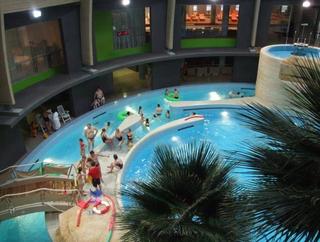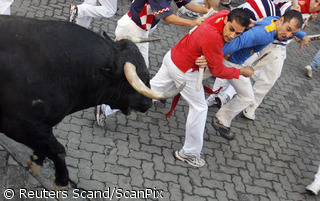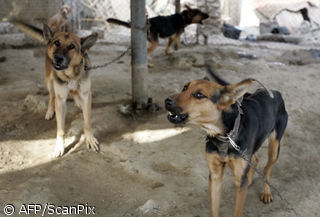European Union supporters in Latvia and Estonia expressed concern Thursday about a new survey pegging their countries as the most EU-skeptical in Europe
Published:
4 August 2003 y., Monday
European Union supporters in Latvia and Estonia expressed concern Thursday about a new survey pegging their countries as the most EU-skeptical in Europe—findings that come just two months before both Baltic states hold referendums on membership. A mere 32 percent of Estonians and 37 percent of Latvians agreed entry would be "a good thing," making them the most pessimistic of those questioned in the EU study released Wednesday. By contrast, 72 percent of Cypriots and 61 percent of Poles said joining would be good for them.
Latvia and Estonia will be the last of 10 EU candidate countries to put the issue of entry to a vote—and observers say there's now a chance that one or both nations could become the first to reject membership in Europe's most powerful multilateral club.
"People are afraid, they don't know what to believe and they're confused," said Pille-Mai Helemae, spokeswoman for the high-profile "Yes to the EU" group in Estonia. "It's going to be a hard fight. But in the end, I'm sure enough people will see more pros than cons to membership." Confusion about the EU was illustrated in the biannual Eurobarometer _ which questioned 1,000 people in each candidate nation in May—with 62 percent of Latvian and 71 percent of Estonian respondents saying they were either poorly informed about the accession process or not informed at all.
The Czech Republic, Hungary, Lithuania, Poland, Slovakia, Slovenia and Malta have already approved EU referendums, most by wide margins. Cyprus is leaving it's decision to lawmakers. If Estonia and Latvia pass their plebiscites on Sept. 14 and Sept. 20 respectively, they would join the EU together with the other candidates in 2004.
Virtually all top leaders in Estonia and Latvia have been pro-EU since the Baltic Sea nations regained independence—arguing that entry will raise their nations international stature, forge vital European trade links and boost living standards.
But official enthusiasm has never been matched outside the halls of power, with many Estonians and Latvians fearing a loss of sovereignty to the EU. Anti-EU groups compare what they say is an overly centralized EU with the U.S.S.R.; one of their symbols is an EU flag stamped with a Communist hammer and sickle.
If the results of the latest survey spooked EU supporters, they delighted opponents. "If you're a EU supporter, I believe the picture is even blacker," said Uno Silberg, who heads Estonia's "No to the EU Movement." "We're confident the referendum will fail."
Šaltinis:
balticsww.com
Copying, publishing, announcing any information from the News.lt portal without written permission of News.lt editorial office is prohibited.
The most popular articles
 14-year-old Nathan Clark drowned after being sucked into the Thai water park in the popular resort of Pattaya pool's pumping system.
more »
14-year-old Nathan Clark drowned after being sucked into the Thai water park in the popular resort of Pattaya pool's pumping system.
more »
 The sixth day of Spain's Pamplona bull run got off with a bang.
more »
The sixth day of Spain's Pamplona bull run got off with a bang.
more »
 China drafts its first animal protection law to prevent animal abuse.
more »
China drafts its first animal protection law to prevent animal abuse.
more »
 You arrive at the airport ready for your flight - but upon arrival you find the flight has been overbooked leaving you waiting for another one.
more »
You arrive at the airport ready for your flight - but upon arrival you find the flight has been overbooked leaving you waiting for another one.
more »
 Former Defense Secretary Robert McNamara, the leading architect of U.S. involvement in the Vietnam War, has died in his sleep at his home in Washington, D.C.
more »
Former Defense Secretary Robert McNamara, the leading architect of U.S. involvement in the Vietnam War, has died in his sleep at his home in Washington, D.C.
more »
 Tips and advice for a hassle-free holiday in Europe.
more »
Tips and advice for a hassle-free holiday in Europe.
more »
 Some EU countries are making it hard for other EU nationals to obtain residence permits.
more »
Some EU countries are making it hard for other EU nationals to obtain residence permits.
more »
 People, who lay claim to the state sponsored housing loans, can already submit applications on receiving a credit under preferential conditions in Bank SNORAS.
more »
People, who lay claim to the state sponsored housing loans, can already submit applications on receiving a credit under preferential conditions in Bank SNORAS.
more »
 From July 1, all gambling activities in Russia have to move to 4 designated zones, far from the bright lights of the big cities, or cease altogether.
more »
From July 1, all gambling activities in Russia have to move to 4 designated zones, far from the bright lights of the big cities, or cease altogether.
more »
 French President Nicolas Sarkozy supports a group of legislators, who've said they're concerned that increasing numbers of women are wearing burqas in France.
more »
French President Nicolas Sarkozy supports a group of legislators, who've said they're concerned that increasing numbers of women are wearing burqas in France.
more »